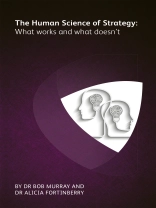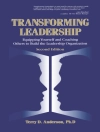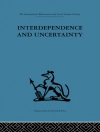Research shows that 80 percent of all strategic initiatives by professional service firms fail to meet their objectives. This book is about how to make them a success. Strategy is, in the end, about people, and will succeed or fail depending on how well partners, employees, clients, and others apply it. Scientifically, there are several basic elements in getting human beings to adopt any new strategic idea, which can be encapsulated in four questions: – Will it give me more certainty in areas of my life that I most care about? – Will it give me more autonomy, more freedom, more choice in the areas of my life that I most care about? – Will it increase the amount of trust that people have in me? – Will it increase my value, my status, in the eyes of those that I care about? Almost all of the strategic failures that the authors – Dr Bob Murray and Dr Alicia Fortinberry – have witnessed or researched have come about because the key stakeholders have answered one or more of these questions in the negative. The Human Science of Strategy: what works and what doesn’t examines the issues behind each of these questions and shows how they form the drivers of almost all human decision-making and behaviour.
विषयसूची
Executive summary About the authors Chapter 1: Why strategies fail Chapter 2: Purpose, meaning and values: why the why matters Chapter 3: The neurogenetics of strategy Chapter 4: Why the assumptions behind strategies are almost always wrong Chapter 5: Strategy and the basic human drivers Chapter 6: Humanizing strategy Chapter 7: The culture problem Chapter 8: Leadership for strategy implementation Chapter 9: Communicating strategy Chapter 10: Getting buy-in to change Chapter 11: Building trust in the strategy and the leadership Chapter 12: Getting it all right
लेखक के बारे में
DR BOB MURRAY Bob Murray, MBA, Ph D is an internationally recognized expert in strategy, leadership, influencing, human motivation, and behavioral change. Bob’s insights are based on his wide experience in business as well as his deep knowledge of research in the areas of management, psychology, genetics and neurobiology. Clients include premier global law firms and mid-sized firms in Australia, the UK and Europe, alongside many Fortune Global 500 corporations. With his colleague Dr Alicia Fortinberry, Bob won the American Science Achievement Award and was appointed to head the Obama Administration’s comprehensive national work stress initiative. Bob’s latest book with Dr Alicia Fortinberry, Leading the Future: The new human science of law firm strategy and leadership (Ark Group, London), shows the potential impact of the new science of being human on organizational success. With Alicia he is also the author of the international best-sellers Creating Optimism and Raising an Optimistic Child (Mc Graw-Hill, New York). Dr Bob has lectured at Sydney, Melbourne, Duke, Tufts, South Florida and California State universities. DR ALICIA FORTINBERRY Alicia Fortinberry, Ph D (Organizational Psychology) has gained global recognition for her powerful, lasting impact on top-tier law and other organizations and leaders. Drawing on the latest science of human motivation and change, Alicia enables firms to shape strategy and build the right leadership, performance and diverse, cohesive culture. Alicia’s clients include internationals such as Herbert Smith Freehills and Allens Linklaters and major national and mid-sized law firms, as well as many Fortune Global 500 corporations. With her partner Dr Bob Murray, Alicia received the highly prestigious American Science Achievement Award and was appointed to head the US government’s comprehensive national work stress initiative. Their latest book, Leading the Future: The new human science of law firm strategy and leadership (Ark Group, London), guides leaders to apply the latest science to areas such as navigating a firm or practice group through rapid change, managing high performance teams, and understanding the needs and motivators of clients. With Bob she also wrote two international best-sellers Creating Optimism and Raising an Optimistic Child (Mc Graw-Hill, New York).












